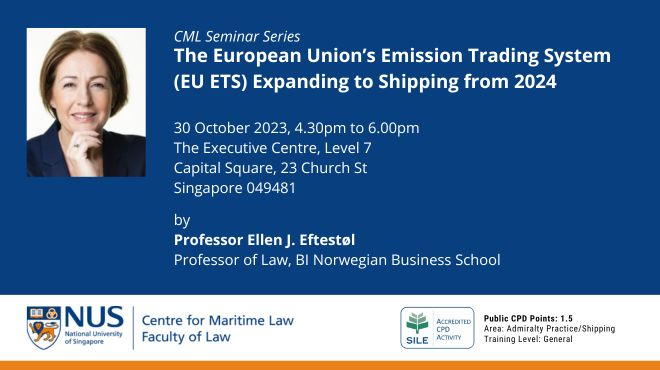Total Registrations: 0
Description
After lengthy discussions and several legal proposals, the European Union (EU) finally managed to agree on expanding the European Union EmissionTrading System (EU ETS) to shipping (including international shipping) starting in 2024. The extension takes place by amendments to the 2003 ETS directive 2003/87/EC on establishing a system for greenhouse gas emission allowance trading within the Union, as well as to the 2015/757 regulationon monitoring, reporting and verification of carbon dioxide emissions from maritime transport, (the MRV-regulation). The consequence of theexpansion is that starting from 1 January 2024, it will be illegal for any shipping company calling on an EU port to emit CO2 without a permit. Thepermits are limited and come with a price. Infringements are penalised. The seminar will outline the ETS system and its inclusion of internationalshipping. The focus will be on the scoping provisions; to whom and what trades will the system apply? These questions have been subject to lengthypolitical discussions, together with the question of who will foot the bill. Will it be the Shipowner, the Charterer or somebody else?
ABOUT THE SPEAKER
Ellen J. Eftestøl works as a Professor of Law at the Department of Law and Governance at BI Norwegian Business Schooland as a Visiting Professor at the School of Business, Economics and Law, Department of Law, University of Gothenburg.She has previously been Visiting Professor at the Scandinavian Institute of Maritime Law, University of Oslo and fullProfessor of Civil and Commercial Law at the University of Helsinki.
Ellen J. Eftestøl is the subject editor for Karnov’s Digital Law Commentary relating to the Norwegian Maritime Code as wellas the author of the same publisher’s digital commentary on the Norwegian Act relating to Commercial Agents andCommercial Travellers. She is an Editorial Staff member for the journal
European Transport Law (ETL).
Eftestøl takes a strong interest in international trade and transport. She has published both in Norwegian and English onthese topics. Her most recent books are European Sustainable Carriage of Goods – The Role of Contract Law (Routledge,2016) and Sustainable and Efficient Transport – Incentives for Promoting a Green Transport Market (Edward ElgarPublishing, 2019) (co-edited with Suvi Sankari and Anu Bask). She has written several articles on how law can be (and is)utilised as a regulatory tool to combat climate change, and particularly CO2 emissions from the transport sector.
Ellen J. Eftestøl does her legal research in collaboration with industry representatives in a cross disciplinary environment.She also gives legal expert opinions and acts as arbitrator.
Terms and Conditions
1. Fees are to be paid before the commencement of the event with exception of e-invoices.
2. Fees paid are non-refundable.
3. Registration is transferable within the same organisation if the request is made at least one week before the event.
4. By filling up this Registration Form,
i. Participants agree and consent that their personal data provided in this form may be collected, used, processed, and disclosed by NUS and the event organisers for the purposes of processing their registration, in accordance with the Personal Data Protection Act 2012 and all subsidiary legislation related thereto.
In respect to disclosure, NUS may disclose participants personal data to thirdparties (which may be in or outside of Singapore) where necessary for such purposes.
ii. Participants will also consent to NUS taking photographs and videos for the purposes of event reporting, marketing, publicity, and media/social media. Participants further consent to NUS disclosing such photographs and videos to third party media entities (whether in Singapore or otherwise) for publicity purposes, and NUS may identify them by name.
iii. NUS and designated event organisers reserve the right to alter any of the programme or other arrangements for this event, including cancellation or postponement of the event, should circumstances so warrant.
Date and Time
Monday, 30th October 2023 4:30PM GMT+08:00
to
Monday, 30th October 2023 6:00PM GMT+08:00
Organisation
Faculty of Law
Contact Email
cml@nus.edu.sg
Location
The Executive Centre, Level 7 Capital Square, 23 Church St





